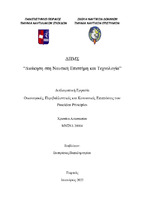Οικονομικές, περιβαλλοντικές και κοινωνικές επιπτώσεις των Poseidon Principles

View/
Keywords
Αρχές Ποσειδώνα ; Ναυτιλία ; Περιβάλλον ; Απανθρακοποίηση ; Poseidon Principles ; Shipping ; Environment ; DecarbonizationAbstract
The Poseidon Principles are a pioneering initiative, established on 18 June 2019 in New York, where the first 11 major banks with a total shipping portfolio exceeding $100 billion, signed up. The breakthrough is the fact that for the first time an initiative like this, links the banking sector, which has been traditionally granting loans to the shipping industry, with the rather ambitious goals of the International Maritime Organization for climate alignment. IMO aims, in terms of carbon emissions, to achieve complete decarbonization by the year 2050, while in general, in terms of greenhouse gas emissions produced by shipping, aims to gradually reduce them to levels of more than 70% to ideally 100%, by the year 2100. Signatories of the Poseidon Principles should take into account environmental parameters they didn’ t consider before, while making lending decisions and assess whether prospective borrower shipping companies are aligned with the IMO's climate goals, if they have the ability to improve their performance, as well as whether the requested funds will be used in investments that will achieve a reduction of the carbon emissions produced by their fleet. The four fundamental Poseidon Principles are: (1) assessment of climate alignment, (2) accountability, (3) enforcement, and (4) transparency. The project seems to be well received by the market and is on an expansionary path. In fact, in 2021 the Poseidon Principles were extended to the marine insurance market.
This paper analyzes the four aforementioned principles and examines their effects from their implementation to date, as well as the economic, environmental and social effects they are expected to bring about in the future.


